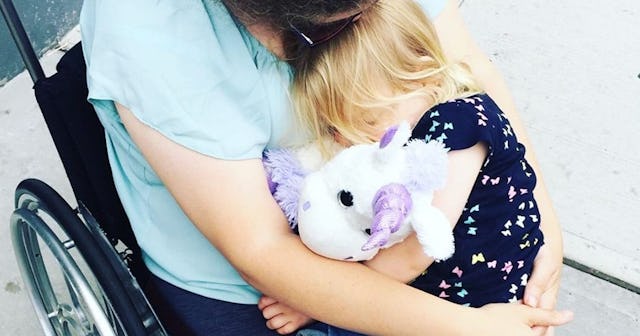It Can Be Hard To Make My Young Daughter Understand My Disability

When Isla started nursery school, I stuck around for a while on her first day. She held my hand for a beat longer than usual, looked at me, and then went to play.
From my wheelchair in the corner, I watched her play and tried not to mess with her moment.
That day, she did things that made sense to people who were three. Playing alone together with other kids.
After a while, a boy asked my daughter, not unkindly, “Why is your Mummy in a wheelchair?”
My heart squeezed.
This was the first time my kid had to answer that question on her own.
Before this, our friends at baby groups, children and their parents, never really asked me about my wheels. They just made room for us in whatever annoying singing circle there was.
And instead of getting on the floor back then, Isla sat in my lap. I was perfectly content in my own seat, cuddling Isla and checking out other people’s new mother bald spots, because that’s kinda what the view was from where I sat.
No one cared about my wheels. The kids couldn’t ask questions and we were all in the same sleepless boat.
Josh Appel/Unsplash
There was no such cushion on Isla’s first day at school. One of the tears that had brightened my eyes escaped down my face, and I waited.
“That’s just my mummy,” replied my girl. She was three, and I made sense to her.
Honestly, she hadn’t asked me before this, but I told her a few times that’s just how it was.
Some people are on wheels, some people can’t hear very well, some people can’t see all that well, some people have service dogs.
And some people don’t.
But the emphasis is that people are people.
Isla knows what I can do, and she knows that when she runs down hills I can’t catch her.
She knows that I need help around the house, and before she leaves for school, asks me which of my PAs is going to be driving us home from the school gates.
I’ve talked about our routine before.
But when she’s watching TV, she asks me to lay down with her.
When we buy her a toy and she’s more interested in the box, and then she falls into that box, she gets me to pull her out.
I do the silly voices when we read. So silly sometimes that she asks for my “regular” voice.
Isla knows that I need ramps, and that stairs are not my friends.
She gets almost as excited as I do when I can do a full turning-circle anywhere, and we can all sit together at the movies.
She doesn’t know the depth of my frustration sometimes.
How you can be the biggest advocate for equal access and human rights there ever was, but sometimes disability is hard, and CP (cerebral palsy) hurts.
How that pain has morphed from the kid thrown out of Brownies because the trips were inaccessible, to the 30-something with actually chronic back pain that I’ve only recently acknowledged.
Hi. I hurt. All the time. It’s managed. By me, and my sports massage person, and sometimes a good book and my friends Ben and Jerry.
Isla doesn’t see that. Because she’s four. She thinks I can do anything, until I say otherwise.
Isla doesn’t see when I rage that wheelchairs are compared to strollers, and what looked like level access in real estate photos is actually a house on a hill.
AbsolutVision/Unsplash
Isla didn’t see that I got stuck between a wall and a full box at a house viewing this weekend. That another potential renter put his hands on my wheelchair and said, “Shall I just grab and pull?”
She didn’t see any of that, but she might have heard me say “UM, NO.”
When I told my husband about that one later, he said that I should have grabbed and pulled somewhere on Mr. Helpful.
So, there have been a few days of interestingness around here.
Isla asked me today why I actually have people come in to “look after us.” I told her, “They don’t look after us, Mummy just needs help with stuff.”
“Is it because I have too many Legos?” she asked. “Am I bad?”
And I might have cried like I cried on Saturday, because of that damn hill, or like last year when Isla told that kid, “That’s just my mummy.”
“No, you’re not bad. It’s just that people need help sometimes. And that’s OK.”
She accepted that and went off to play. Again. That’s what four year-olds do.
I went in later and as we do, made a game of picking up her toys with my grabber. “Now Isla, when you asked if you had too many Legos …let’s talk about that again, shall we?”
This article was originally published on